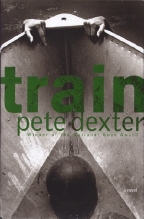Train
Pete Dexter
Doubleday / Random House
US Hardcover First
ISBN 0-385-50591-4
Publication Date: 10-07-2003
280 Pages; $24.95
Date Reviewed: 10-20-03
Reviewed by: Rick Kleffel © 2003

REFERENCES
COLUMNS
|
|
|
TrainPete DexterDoubleday / Random HouseUS Hardcover FirstISBN 0-385-50591-4Publication Date: 10-07-2003280 Pages; $24.95Date Reviewed: 10-20-03Reviewed by: Rick Kleffel © 2003 |
|
|
REFERENCES |
COLUMNS |
When a writer captures life in words, the words themselves take on life. Some writers corral their subjects in elegant prose, rich and colorful, prose that glows with light bursts of nuance and dense gusts of import. Other writers build with language that's eggshell thin, a fragile screen upon which the lives of their creations play with exquisite detail. Pete Dexter is barely a breath away from his characters in 'Train'. Set in Los Angeles in 1953, 'Train' is a novel of such simmering intensity that it constantly seems on the edge of breaking. It never breaks, it never bends, but 'Train' brings the reader so close to ordinary people that readers will be justly afraid to breathe while reading it. The tension, the attention is so focused, the prose is so controlled, so tightly leashed, that the reading experience is akin to walking on a glass pane over a pit of dangerous prisoners. One slip, one word missed, one gesture glossed over, and the heartbreaking violence of which any human is capable will come crashing through. But that violence, that intensity comes crashing through anyway. That's the point of fragile, clear, clean prose. Stay out of the way of the knockout punch.
Train is the nickname of Lionel Walk, a seventeen-year old black caddy in an exclusive Los Angeles golf club of 1953. He's a complete natural, who only has to cease thinking and get out of his own way to hit the ball wherever he wants, whenever he wants. One day, he finds himself caddying for Miller Packard, whom he calls 'The Mile Away Man'. Miller is a cop so tightly coiled he's hard to distinguish from the criminals he bothers to leave alive for capture. In an instant, he notes Train's natural talent. Norah Still is the disfigured survivor of a yacht hijacking that Packard brings to a brisk conclusion. As Dexter's tale untangles itself, the three come into the kind of unstable orbit that can only lead to a crash.
Though it contains all the elements of a noir or a mystery, 'Train' does not read like a mystery. There are no clues, no real mysteries and the plot moves slowly, delicately, as fits the close and careful writing. Dexter writes not like James Ellroy, but like William Gay, Flannery O'Connor or William Faulkner. 'Train' has all the elements of a Southern Grotesque, but in this case, the 'south' is southern California. Like O'Connor, Dexter hones in on subtle and unsubtle absurdities that dot the landscape of his work. The spiritual slides towards the supernatural, but nothing is specified. The tone is deadly serious even when what's being described is oddly funny. This subtle humor leavens the novel; it's shot through with flashes of laughter that ring in the dry-as-dust atmosphere. Cooper and his wife susan (that's a deliberate small-s susan), who run the gold course where Trains finds a a temporary home, and the angry waddling woman Billie, who manages the staff, are all angular enough to be real and odd enough to evoke a smile. But their fragile eccentricity hides a layer of raw humanity that constantly boils just beneath the surface of this powerful novel.
Dexter depicts the racism of the times without flinching. But it's done in the absence of judgment; he's merely a camera passing on the information to the reader. The result is a series of images as powerful as those captured by would-be photographer small-s susan. She follows two black men engaged in a brutal duel to the death with garden tools, dispassionately documenting their demise. Dexter lets his novel do the talking with the quiet power of his precise prose. It's a wise decision. An ambitious but disfigured black priest, analogous to Asa Hawks of O'Connor's 'Wise Blood', speaks for the downtrodden residents of Darktown, often at their expense. You can feel the love and hate.
Since 'Train' deals so dispassionately with it's characters, it's surprising how much and how well it deals with their sexuality. Predators, prisoners of all types and races are made and broken in the rocky social landscape of forced change and class combat. Dexter doesn't linger on the details, but pulls the power of pleasure-based relationships onto the printed page without effort. Dexter's not trying to seduce the reader, and for the most part his characters aren't trying to seduce one another. Every transaction is based on the power one character has to impose their will upon another.
'Train' wins the reader's affection not just by pure power plays, by getting so close to the characters that the reader is scared to breathe, but by creating characters who are true to their time and true to their natures. While Packard is the man with the power, it's Train who displays the power of complex emotional responsibility. He's able to look beyond himself to the welfare of others, especially Plural, a fellow caddy who becomes Train's family. Dexter simply stands back and lets the language do the talking. There are moments of joy, terror, absurdity and love in life and in Dexter's novel. The experience, from one to the other, is not too different. The life of Dexter's language is that of light, refracted through a lens, focused on people so like the reader that distance disappears.